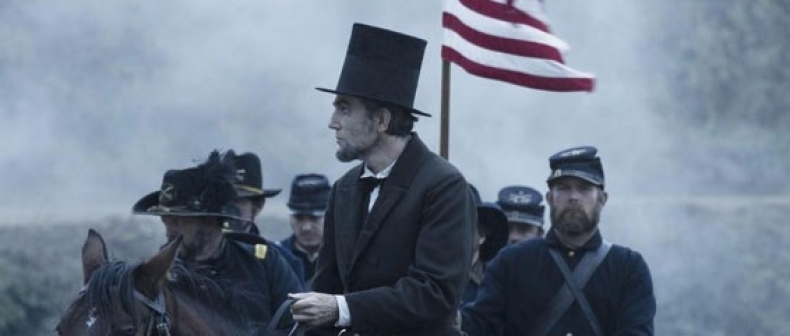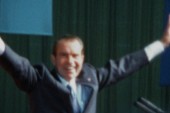
“Lincoln”
Abraham Lincoln looms so large in the popular imagination not only because he was a great statesman, but because he was a great writer. His speeches, which belong with the writings of Melville, Whitman, and Twain as seminal works of American literature, contain a playwright’s sense of drama–a keen, almost unerring attention to phrasing, rhythm, weight, and effect. (Lincoln was, in fact, a huge fan of the theatre and went often.) It’s fitting, then, that the greatest living American playwright, Tony Kushner, should have written the screenplay to Lincoln, an enormously stirring account of the president’s most notable achievement: the passing of the Thirteenth Amendment abolishing slavery. Other screenwriters might have convincingly reproduced Lincoln’s oratorical genius, but maybe no one but Kushner could’ve had the insight to make that genius the film’s primary subject. Lincoln is about the art of verbal persuasion. The title character is a hero not just for what he’s trying to achieve–other men worked more selflessly than he towards that same goal–but because his mastery of address makes him more likely than anyone to achieve it.
As conceived by Kushner and embodied, gloriously, by Daniel Day-Lewis (who’s a dead ringer), this Lincoln is a conscious performer. When first we see him, he’s even posed like a revered star of the stage. On a Civil War battlefield in the dead of night, he sits on a raised platform, backlit by torchlight, an object of inspiration for the tired, awestruck soldiers. Fully aware of the effect he has on the young men before him, he barely speaks–he simply listens to their concerns and comports himself with authority. It’s only back home in Washington–his battlefield–that he goes into action, turning his considerable powers of showmanship toward the conflicting goals of stopping the war and passing the amendment. (To get the latter, Lincoln had to forestall the former, using peace, essentially, as a carrot.) In contentious meetings with his divided cabinet, he ventures whatever’s needed to move his agenda forward: grave pronouncements, folksy anecdotes, off-colour jokes, dramatic silences, thunderous outbursts. Though never less than genuine, he’s always thinking about the effect he has on others, always adapting for maximum impact.
If it isn’t clear already, Lincoln is an unapologetically talky film, dedicated almost entirely to political procedure. (It’s adapted from a handful of pages in Doris Kearns Goodwin’s Team of Rivals: The Political Genius of Abraham Lincoln.) Indeed, the sheer quantity of verbiage—not just from Lincoln, but from his supporters and opponents in the House–is a bit of a shock initially, almost an affront. Having been taught that movies are primarily a visual medium, we’re not used to listening intently at them, and I expect some in the audience will resent having to do so. But this is one of those rare talky films in which the talk is actually worth listening to. Like Lincoln, Kushner (Angels in America, Caroline, or Change) mixes elevated language with unexpected humour, and his script is alternately poetic and playful, sometimes both at once. He gives Lincoln the amusing habit–historically accurate, apparently–of launching into old-man stories at every opportunity, stories that invariably exasperate his cabinet. (At one point, he tells a surprisingly good joke about a portrait of George Washington hung above a toilet.) At other times, he’s the pensive, deeply serious man we know from the portraits and textbooks, prone to musing aloud about the meaning of equality and freedom.
What he isn’t is a cardboard saint. When needed, Lincoln breaks rules, bribes his opponents, even flagrantly lies in the name of the greater good. (When you get right down to it, the whole Thirteenth Amendment was essentially an act of back-room chicanery.) What’s remarkable is how little Kushner makes of this. Where other films belabour the tragedy of compromised ideals, Lincoln treats us as adults who know a bit about how the world works, and the various acts of political underhandedness pass without any handwringing. (Incidentally, I don’t know how so many critics have come to the touchy-feely conclusion that Lincoln is about the virtues of bipartisanship. If anything, it’s about a leader who goes rogue and has the moral conviction to drag everyone else with him.)
This Lincoln isn’t motivated by an anachronistic love of black folks, either. He respects them and he believes they deserve equal rights under the law, but he isn’t exactly longing to go for beers with them. When questioned by his wife’s black maid (Gloria Reuben) about the extent of his support for her people, he answers honestly, without any false comfort. “I don’t know you,” he says. “I assume I’ll get used to you.” More than most, Kushner is resolutely realistic about the chasm separating whites and blacks, both in Lincoln’s era and in ours. Lincoln’s line here echoes the moment in Caroline, or Change when the young Jewish boy asks his black housekeeper, in the wake of an argument, if they can be friends again. “Weren’t never friends,” she responds. (Imagine a line like that in The Help.)
Maybe the strongest indicator of Kushner’s achievement here is his handling of the sprawling supporting cast, none of whom are just awed witnesses to Lincoln’s genius–they’re fleshed out, often ornery figures. Some of the funniest lines go to Tommy Lee Jones’s Thaddeus Stevens, a fervent abolitionist so unyielding he risks strangling the cause in the cradle. Jones does dry contempt better than anyone, but he also suggests real moral conviction under all the bluster. If Lincoln is the film’s imposing, Olympian hero, Stevens is its cranky human face, and he functions as a needed counterweight. (His last scene might well be the movie’s masterstroke.)
Sally Field also provides counterweight as the sharp, mercurial Mary Todd Lincoln. While Abe is a master of composure, his wife is all chaos and disorder, prone to grief over the death of two sons and half-maddened by the gloomy corridors of the White House. It’s a very tricky part, and if Field doesn’t completely convince in her most inconsolable, unhinged moments, she nails the character’s steely will. (Hidden steel has always been Field’s specialty.) There’s a superb scene where Mary welcomes Stevens to her home, then methodically upbraids him for badmouthing her to his fellow politicians. It’s a bravura buttoning-down, and it leaves you almost as stunned as its target.
I should probably mention at this point that Lincoln was directed by Steven Spielberg, which I expect you already knew. Leaving him unnamed for so long is a gesture, a small attempt on my part to kick sand in the face of the auteur theory, which most critics still consider the only lens through which to view a movie. Though Spielberg has done a remarkable job here, keeping his tendency toward sepia-toned sentimentality largely in check and coming up with some splendid images (particularly in an early dream sequence set on a boat), the idea that Lincoln is largely his achievement–which is the impression you get from practically every review of the movie to date–is nonsense. Spielberg is a great director, but he’s not a particularly deep thinker, and his grave, serious pictures tend to be his least interesting. (Give me Jaws over Schindler’s List any day.) His chief contribution here–I’m downplaying it, but it’s a significant one–is ceding the spotlight to Kushner’s words. Not all directors would have the humility to do that.
Spielberg also deserves credit for enabling Day-Lewis’s beautiful, transporting, heroic performance. I’m kind of at a loss to describe what Day-Lewis has done here. In recent years, he’d begun to lose me a bit with a series of impeccable but hollow performances. His Bill the Butcher in Gangs of New York and his Daniel Plainview in There Will Be Blood were both hugely imposing and memorable, but I couldn’t detect any interior life in them. They were just Method versions of stock movie monsters. As Lincoln, Day-Lewis goes far beyond them, and beyond everything else he’s done, too. It doesn’t feel as if he’s acting–it’s like he’s simply willed Lincoln into being. You can marvel at his physical resemblance and be moved by his high, melodious voice (which is said to be historically accurate), but what you mostly respond to is the love Day-Lewis clearly has for this man. I don’t know how to describe it, it’s just recognizably there, and it fills the space between himself and the character. This isn’t anything so banal as an icon humanized–it’s an icon refreshed and made even more iconic than before.
On my way home from the theatre, I found myself weighing the film in my mind and comparing it to the cinematic greats. (It’s a bad habit I have.) Was Lincoln, too, a great film? Much as I enjoyed the movie, I found stray pieces of it–some of the opening and closing scenes, a subplot about Lincoln’s son (Joseph Gordon-Levitt), a handful of music cues–to be banal. Also, I worried that a movie so dialogue-centred couldn’t rightly be called great cinema. But then I thought of Olivier’s Shakespeare adaptations, and of The Member of the Wedding, Long Day’s Journey Into Night, and Vanya on 42nd Street: great films that wear their literacy proudly. I also thought about films like Eyes Wide Shut and The Tree of Life and how they’re considered great even though their screenplays are drivel. In the end, I decided not to worry overmuch about it and went back to replaying highlights from the movie in my mind’s eye: Lincoln’s melancholy after the South’s surrender, his speech about being “clothed in immense power.” Lincoln may or may not be a great movie–only time will tell that–but it’s a great moviegoing experience.
____
Scott MacDonald writes about cinema for Toronto Standard. You can follow him on Twitter at @scottpmac. He just started tweeting, so be gentle with him.
For more, follow us on Twitter @TorontoStandard and subscribe to our newsletter.














